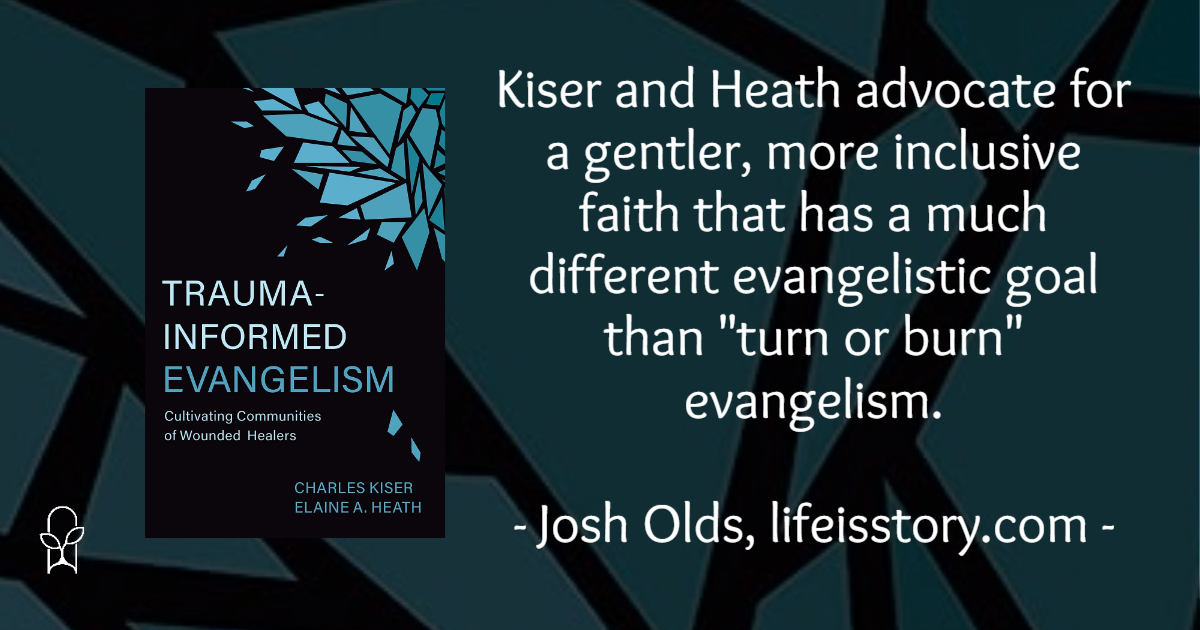
Published by Eerdmans on April 11, 2023
Genres: Academic, Non-Fiction, Christian Life, Leadership, Theology
Buy on Amazon
Goodreads

“We are at the forefront of a new reformation.”
So declares Elaine Heath in Trauma-Informed Evangelism, aiming to recover the God of love from the structures of hate that pervade Christian communities in America today. In their new guide, she and Charles Kiser work toward bringing this reformation to fruition through ministering specifically to the spiritually traumatized.
Over the course of their study, Kiser and Heath amplify the voices of those who suffered misogynistic, racist, or homophobic abuse at the hands of the church. While carefully listening to these stories, Kiser and Heath bring them into conversation with the passion and resurrection of Jesus. Engaging with womanist and liberation theology, they see in the crucifixion a God who does not valorize suffering but shares the experience of the traumatized. Ultimately, this theodicy leads them to propose a new evangelism—one based not on fear and coercion but on witnessing the unconditional love of God.
Timely, theologically informed, and eminently practical, Trauma-Informed Evangelism will serve as a formative guide for church leaders and students seeking to aid trauma survivors in their communities. Discussion questions conclude each chapter.
In undergraduate school, I had to take a class on evangelism. Evangelism 101 with professors Kirk Cameron (yes, that one) and Ray Comfort. They weren’t really the professors, but it was their The Way of the Master street evangelism program on which the class was modeled. I had grown up in the fundamentalist/conservative evangelical world—homeschooled and all the works—and even then the concept just didn’t sit right with me. Our final assignment was to literally go out in public, pick a stranger, ask them if they were saved, and if they said no try to lead them to Christ. Which we were to do by asking “If you were to die tonight, do you know where you would go?”
In Trauma-Informed Evangelism, Charles Kiser and Elaine A. Heath talk about how that is precisely the wrong strategy for evangelism. Particularly in the Western world, Christianity is everywhere. It’s not that people don’t know about Jesus, it’s that what they’ve heard about or experienced from Christians has made Jesus not palatable. Kiser begins the book by talking about how he came to realize the amount of spiritual trauma that nonreligious people often carry: “The pain was so widespread—almost every single one of my nonreligious friends volunteered to share the wounds they carried from religion.” Those conversations became a doctoral dissertation and that dissertation eventually led to this book, cowritten by Kiser and his doctoral supervisor, Elaine Heath.
Trauma-Informed Evangelism is an academic work. While it’s less-academic in structure than what a dissertation would be, you can tell that much of the literature review from that was moved over into this. Kiser and Heath occasionally go deep into analyzing theologians and talking about how this scholar commented on that scholar and it’s all very interesting if you’re within that world (I am) but probably not so much if you’re just the average person trying to share your faith without doing harm. I want to note that tone simply because while it isn’t inherently bad, I think the book would have had a wider audience and greater appeal if it had been adapted to a general, rather than academic, audience.
That tone also affects some of the book’s structure. Early on, Kiser and Heath give readers a sampling of spiritual trauma. It reads like a boxing match where one person has their hands tied. Kiser and Heath keep punching with anecdote after anecdote and while some of those stories are integrated into the larger narrative, the way in which they are told show the trauma element but not as often the evangelism. That critique is probably my biggest one with Trauma-Informed Evangelism. It does a great job of describing spiritual trauma, pinpointing certain theological concepts as being possibly traumatic, and identifying Jesus as a victim of trauma—but the evangelism part seems sort of tacked on to the end of the book.
What Kiser and Heath have to say about Trauma-Informed Evangelism is good—basically you could boil it all down to being a faithful presence in the community that is aware of potential spiritual trauma—but the book is really less about evangelism than the title would make it seem. Shortening parts one (examples of trauma) and two (theological concepts regarding trauma) and expanding part three (evangelizing amid trauma) would make the work more accessible and more practical.
Trauma-Informed Evangelism has its strengths. Kiser and Heath are able to adequately show how traditional evangelism can be traumatic at worst and off-putting at best. They discuss how certain theories of atonement can feel traumatic. And they advocate for a gentler, more inclusive faith that has a much different evangelistic goal than “turn or burn” evangelism. Above all, this book shows that it is possible for Christians to appropriately share their faith in ways that are appealing and do no harm. While I have some quibbles about the form of their content, the message itself is quite strong.
